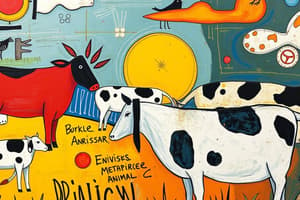Podcast
Questions and Answers
What does the quote 'A row of sheds fronted with double bars, like small animal cages' suggest about the conditions of the prisoners?
What does the quote 'A row of sheds fronted with double bars, like small animal cages' suggest about the conditions of the prisoners?
It implies that the prisoners were living in terrible conditions, likening their situation to that of animals in cages.
How does Orwell describe the man who will be hanged?
How does Orwell describe the man who will be hanged?
As a 'puny wisp of a man', highlighting his frailty and lack of power.
What does Orwell observe about the wardens' treatment of the condemned man?
What does Orwell observe about the wardens' treatment of the condemned man?
They have a careful, caressing grip on him, indicating a sense of care.
What does Orwell mean by 'unspeakable wrongness' in relation to the execution?
What does Orwell mean by 'unspeakable wrongness' in relation to the execution?
What role does the dog play in the narrative?
What role does the dog play in the narrative?
What reaction does the prisoner have towards the dog?
What reaction does the prisoner have towards the dog?
What bodily functions does Orwell highlight in condemned men?
What bodily functions does Orwell highlight in condemned men?
What does the superintendent's reaction to the body reveal?
What does the superintendent's reaction to the body reveal?
What feeling is expressed by the men after the execution?
What feeling is expressed by the men after the execution?
What irony is present in the moment after the execution?
What irony is present in the moment after the execution?
Flashcards are hidden until you start studying
Study Notes
Prison Conditions
- Descriptions of sheds likened to animal cages emphasize the dehumanizing conditions faced by prisoners.
- Use of simile illustrates Orwell's shock at the treatment of human beings reflecting a broader commentary on injustice.
Physical Representation
- The condemned man is described as a "puny wisp," invoking feelings of fragility and vulnerability.
- The contrast between the small man and the "six tall Indian warders" highlights the absurdity of power dynamics during execution.
Care and Domination
- Wardens are depicted as caring yet domineering, with their "careful, caressing grip" reflecting a complex relationship.
- Juxtaposition of tender actions against the grim context of execution challenges perceptions of compassion in oppressive situations.
Vitality and Life
- Orwell reflects on the "unspeakable wrongness" of ending a life full of vitality, symbolized by the "full tide" metaphor.
- The poignant observation serves as a critique of capital punishment, emphasizing the preciousness of life regardless of circumstance.
Dark Humor
- Introduction of a dog during a solemn event uses black humor, contrasting the dog’s innocence with the weight of the occasion.
- The dog's actions serve to highlight the disconnection between life and death, illustrating a comedic perspective even in seriousness.
Indifference to Fate
- The prisoner's incurious reaction to the dog reinforces themes of life's vitality versus impending death, contributing to dark humor.
Human Functions
- Description of bodily functions occurring in condemned men underscores their humanity and normalcy, challenging the justification for their execution.
- This consideration urges readers to recognize the shared human experience among all individuals, including prisoners.
Execution Aftermath
- The superintendent's relief upon confirming the prisoner's death underscores the chilling efficiency of executions.
- This moment highlights a disconnect between the act of killing and the human cost involved.
Collective Relief
- The sense of relief among the warders post-execution indicates the psychological burden lifted despite the moral weight of their actions.
- This collective response suggests a coping mechanism for the psychological strains of carrying out capital punishment.
Irony of Victimhood
- The warders’ desire for alcohol post-execution underscores irony, portraying them as emotional victims needing solace after executing another human.
- This reflects a complex narrative on the effects of carrying out state-sanctioned death, provoking thought on the nature of those involved.
Studying That Suits You
Use AI to generate personalized quizzes and flashcards to suit your learning preferences.




